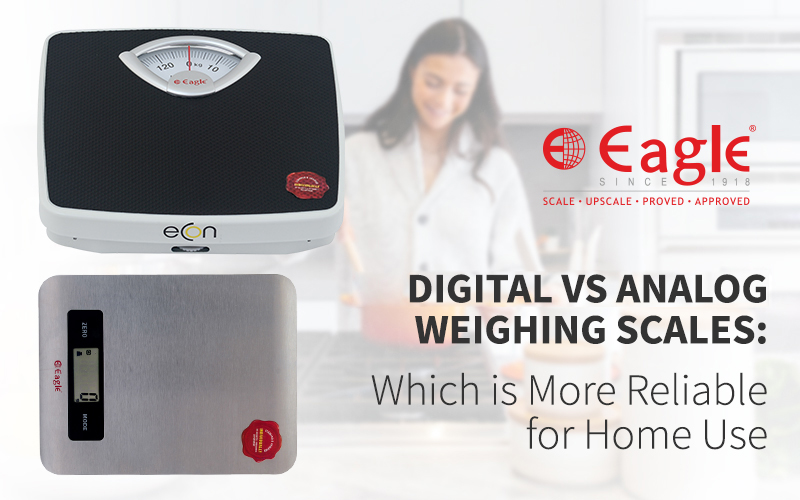When it comes to buying weighing scales for home use, you have two main options to choose from i.e., digital and analog weighing scales. No matter whether you want to keep track of your body weight or you need to measure the quantity of ingredients in your kitchen while cooking, doing it with a quality weighing scale definitely helps.

If you are not sure whether to buy a digital or analog weighing scale for home use, then read this article till the end. Here we will have a meaningful comparison between both these scales to help you reach a better decision soon so stay with us till the end.
What is an Analog Weighing Scale?
Analog scales have long been in use for their simplicity and reliability. Older versions of these scales consisted of two pans that were suspended vertically at equal distances from the fulcrum. The object to be measured is placed in one pan and it is compared with a known weight placed in the other pan. Once two pans are leveled, it shows the weight of the unknown mass.

Most modern analog weighing scales use a mechanism that involves springs. The weight of the object suspended from the spring stretches it with force and that force is related to the weight of the object.
What is a Digital Weighing Scale?
Digital scales tend to give more accurate and precise results which is why they are mostly used across various industries and are considered a more reliable weighing scale option for home use. These scales are easy to read and they give you the flexibility to measure in different weight units.

Digital scales work on batteries or AC/DC power supplies and they give output using resistance load cells. Some of these scales are rechargeable and they display results on LCD screens. Digital scales offer you a wide range of features like built-in memory, timers, smartphone connectivity, and a very high weight sensitivity.
Comparison Between Digital and Analogue Weighing Scales
Now that you know what digital and analog weighing scales are, let’s take a look at a quick comparison between the two to give you a better idea. In this section, we will compare these two scales in terms of accuracy, durability, portability, and many other key factors so that you are able to make a more educated decision as to which scale to buy.
- Accuracy
Analog scales are less accurate since they rely on weights as well as human observation to give a reading which is not that reliable. Digital weighing scales on the other hand use an integrated system with built-in displays that give you an exact value on each use.
- Durability
Both these scales are pretty durable. However analog scales last slightly longer since they do not work on electronic circuits and batteries that can easily get damaged. If you use these with care and keep them away from moisture and water, they can last you several years. Digital scales on the other hand need extra care and maintenance if they are to last long.
- Reliability
In terms of weight measurement, digital weighing scales are more reliable since they use sensitive sensors to detect even the slightest changes in weight. Analog scales use needles that can easily malfunction and give inaccurate results.
- Portability
Analog scales have many heavy electrical parts which makes them less portable. Moreover, you also have to carry weights with these scales which makes it hard to move them. Digital scales are more sleek and compact owing to the lightweight sensors, processors, and other electronic circuits that are used in these.
- Readability
The readability of digital scales is much better than analog scales. If you move while using an analog scale, it can cause fluctuations in the measured value. This doesn’t happen with digital scales that show accurate results up to several decimal points.
- Price
Digital scales tend to be more expensive due to the complex electronic circuits and sensors present inside and they also use electrical power to function which can further increase their cost. Analogue weighing scales don’t use any power and their construction is also not very complex which leads to their lower price.
Benefits of a Digital Weight Scales
- Digital Scales give you precision and consistency. They can detect even minor weight changes.
- These scales give you an instant reading, unlike analog scales where you have to wait for the needle to settle down.
- Digital scales can store your weight record in their built-in storage memory.
- These scales consume very little power and you can replace their batteries with ease.
- Digital scales give you more options in terms of weight units.
- These scales can be connected to smartphones as well.
- You can easily move these scales from one place to another due to their compact designs and shapes.

Drawbacks
- These scales are more expensive.
- They cannot work without AC/DC power or batteries.
- These weighing scales are high maintenance.
Benefits of an Analog Weight Sxales
- The designs of these scales are simple, durable, and low maintenance.
- These scales are very easy to use.
- They don’t contain electronic components which reduces risks of malfunctions.
- These scales have a longer lifespan.
- These scales are cheaper than their digital counterparts.

Drawbacks
- The awkward movement of the pointer or needle can make the reading tough.
- The springs used in these scales are prone to wear and tear.
- These scales do not give you the freedom to choose alternative reading units.
- These scales are less portable.
Conclusion
Now you know what are the main features of digital and analogue weighing scales. You can use the comparison given above to decide whether a digital or analog scale will be best for your home use.

If you are looking for a simple, reliable, and affordable weighing scale and your usage is not that frequent, you can go with an analog scale. However, if you are looking for accuracy, speed, and more options in terms of weighing units, a digital scale is what you need to buy.
You can visit Eagle Scales to find out a wide variety of digital and analog scales for your personal home use.





